Embracing a simple, sustainable life means focusing on what truly matters—minimizing possessions, connecting with nature, and making mindful choices. You can reduce waste by composting, reusing, and selecting eco-friendly products. Incorporate plant-based foods, opt for greener transportation, and conserve water and energy. Creating a green home through repairs and upcycling enhances your space while supporting sustainability. Keep exploring ways to rediscover joy in this balanced lifestyle, and you’ll find a deeper sense of fulfillment awaits.
Key Takeaways
- Simplify your environment by decluttering and embracing minimalism to focus on meaningful experiences and personal growth.
- Engage with nature regularly through outdoor activities to boost mood, reduce stress, and enhance well-being.
- Adopt reusable practices like cloth bags, glass containers, and composting to minimize waste and support sustainability.
- Choose local, seasonal, and plant-based foods to lower your carbon footprint and promote healthy living.
- Rethink transportation habits by walking, biking, or using public transit to reduce emissions and foster physical health.
Embracing Minimalism for a More Fulfilling Lifestyle

Have you ever wondered how embracing minimalism can lead to a more fulfilling life? When you simplify your surroundings, you create space for what truly matters. Let go of excess possessions and focus on quality over quantity. Minimalism encourages you to prioritize experiences, relationships, and personal growth rather than material goods. This shift reduces stress, saves money, and lessens your environmental footprint. As you declutter, you’ll find it easier to stay organized and mindful of your consumption habits. Incorporating eco-friendly minimalism practices can further enhance your overall well-being and positively impact the planet. Practicing mindful consumption helps you make intentional choices that align with your values and promote sustainability. Embracing this mindful approach to living helps foster a deeper appreciation for what you have and promotes a sustainable lifestyle. Recognizing the importance of mindful decluttering strategies can further support your journey toward simplicity and sustainability. For example, choosing vintage decor over fast-furniture can add charm while reducing environmental impact.
Practical Ways to Reduce Household Waste
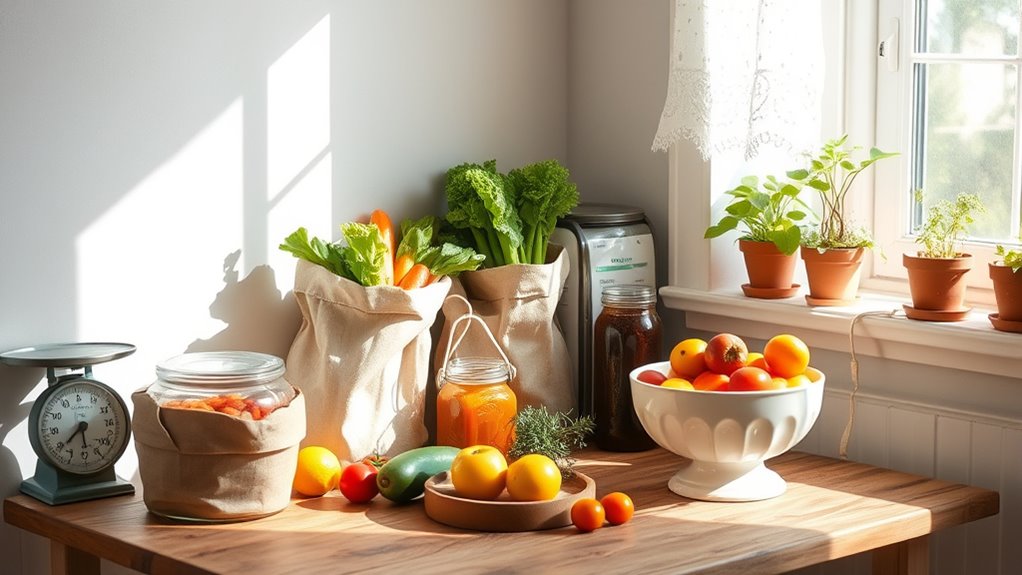
You can cut down household waste by starting to compost food scraps instead of throwing them away. Opt for reusable packaging whenever you shop to reduce single-use plastics. These small changes make a big difference in creating a more sustainable home. Being mindful of food spoilage signs can also help prevent unnecessary waste from spoiled items. Additionally, understanding the shelf life of perishable items can guide you in using products before they go bad. Proper storage techniques and temperature control can further extend the freshness of your food, reducing waste. Embracing automation in business technology can help streamline household management tasks, reducing waste generated from inefficiencies. Moreover, fostering an emotional support environment within your family can help everyone adapt to sustainable lifestyle changes more positively.
Compost Food Scraps
Wondering how to cut down household waste effectively? Composting food scraps is a simple, impactful step. Instead of tossing banana peels, coffee grounds, vegetable scraps, and eggshells into the trash, create a compost bin in your backyard or use a countertop compost container. Break down food waste into smaller pieces to speed up decomposition. Keep the compost moist and turn it regularly to aerate. Over time, your scraps will transform into nutrient-rich soil you can use in your garden or houseplants. Composting reduces the amount of waste sent to landfills, cuts methane emissions, and enriches your soil naturally. Incorporating proper composting techniques can further enhance the process and ensure healthy, rich soil. Using appropriate gear like gloves and tools can make composting safer and more efficient. Additionally, choosing the right composting system can streamline your efforts and increase success. Small actions like this add up to a greener, more mindful lifestyle. Understanding how optimal angles for pinball machines influence gameplay can also inspire a more engaging and precise approach to your hobby. Being aware of local recycling and waste disposal guidelines can help you optimize your composting efforts and minimize contamination.
Choose Reusable Packaging
Switching to reusable packaging is a straightforward way to continue reducing household waste after composting food scraps. It’s simple to cut down on single-use plastics and contribute to a healthier planet. Imagine replacing:
- Plastic grocery bags with sturdy cloth totes, easily carried and reused.
- Disposable water bottles with a sleek stainless steel flask, keeping drinks cold or hot.
- Takeout containers with glass or silicone containers that can be washed and used again.
- Wraps and foils with beeswax wraps or silicone lids, sealing in freshness without waste.
Additionally, incorporating sustainable habits can inspire others in your community to adopt environmentally friendly practices. Being aware of environmental impact helps you make more conscious choices that benefit the planet. Understanding ethical hacking principles can also help protect your personal data when shopping online or managing digital security at home.
Making Sustainable Choices in Daily Shopping
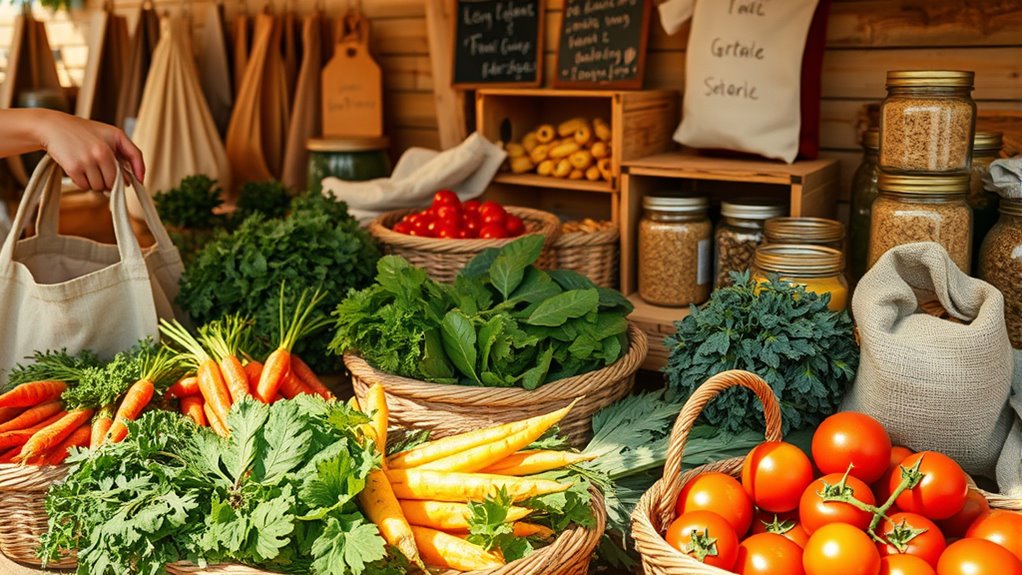
Making sustainable choices in daily shopping is increasingly essential as consumers become more aware of their environmental impact. You can start by choosing products with minimal or recyclable packaging, reducing waste. Opt for local and seasonal foods to lower carbon footprints and support nearby farms. When shopping for clothes, prioritize brands committed to ethical and eco-friendly practices. Using reusable bags, containers, and water bottles helps cut down on plastic waste. Research brands that prioritize sustainability and transparency; many now highlight their environmental efforts. Avoid fast-moving consumer goods that contribute heavily to pollution and waste. Instead, focus on quality items you can repair or reuse. Incorporating aesthetic home decor elements like wall organization systems or reusable table linens can enhance your living space while supporting sustainability. Small, deliberate choices like these add up, helping you live more sustainably while making a positive impact on the planet.
Incorporating Plant-Based Foods Into Your Diet
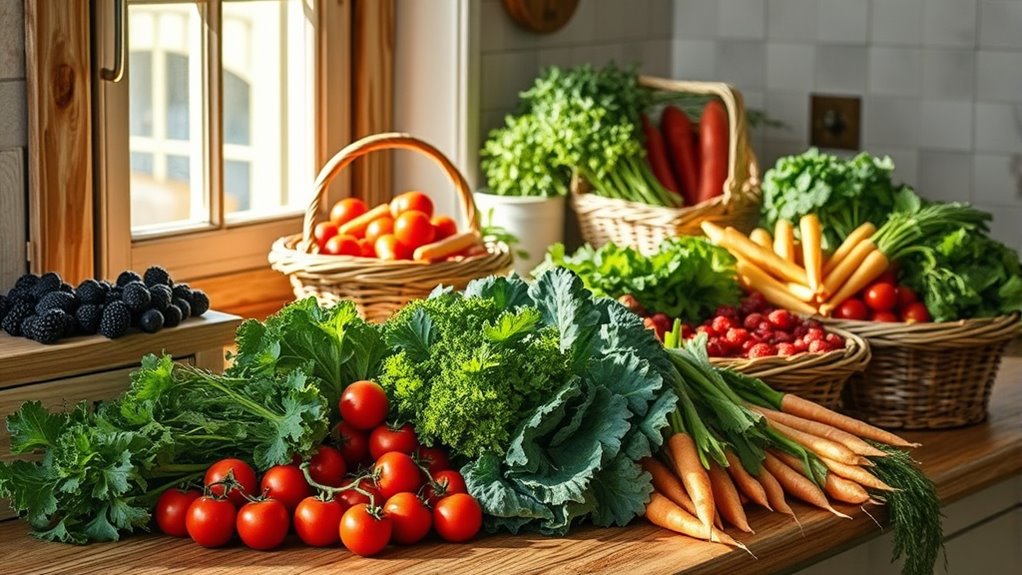
Increasing your intake of plant-based foods is a practical way to reduce your environmental impact while improving your health. Imagine filling your plate with:
- Colorful salads topped with crunchy chickpeas and vibrant vegetables
- Warm bowls of hearty lentil soup simmering with herbs and spices
- Sizzling veggie stir-fries with fragrant garlic and ginger
- Smooth, creamy plant-based smoothies blended with fresh fruit and leafy greens
These simple swaps make your meals more sustainable and nutritious. As you incorporate more plant foods, you’ll notice increased energy and better digestion. Plus, reducing meat consumption helps cut down on greenhouse gases and minimizes waste. Small changes in your diet can lead to big environmental benefits and a healthier, more joyful life. Plant-based diet can also be a fun way to explore new flavors and cooking techniques. Incorporating nutrient-rich foods like chia seeds can further enhance your meals with added fiber, omega-3s, and antioxidants. Additionally, exploring plant-based proteins can diversify your meals and ensure balanced nutrition. Embracing plant-forward eating encourages mindful choices that support both personal health and the planet.
Rethinking Transportation: Going Green on the Move

Have you considered how your daily commute impacts the environment? Choosing greener transportation options can make a real difference. Walking or biking not only reduces emissions but also boosts your health. Public transit, like buses and trains, cuts down the number of individual vehicles on the road, lowering greenhouse gases. If you need a car, consider switching to an electric or hybrid model to minimize your carbon footprint. Carpooling with colleagues or neighbors also spreads out emissions and saves money. Small changes, like consolidating errands or planning routes more efficiently, add up over time. Understanding narcissistic traits can help you recognize manipulative behaviors in others, including those in your community or family. By rethinking how you get from point A to B, you’re supporting a sustainable future and reducing your personal impact on climate change. Green transportation isn’t just good for the planet—it’s good for you too.
Cultivating Mindful Water and Energy Use
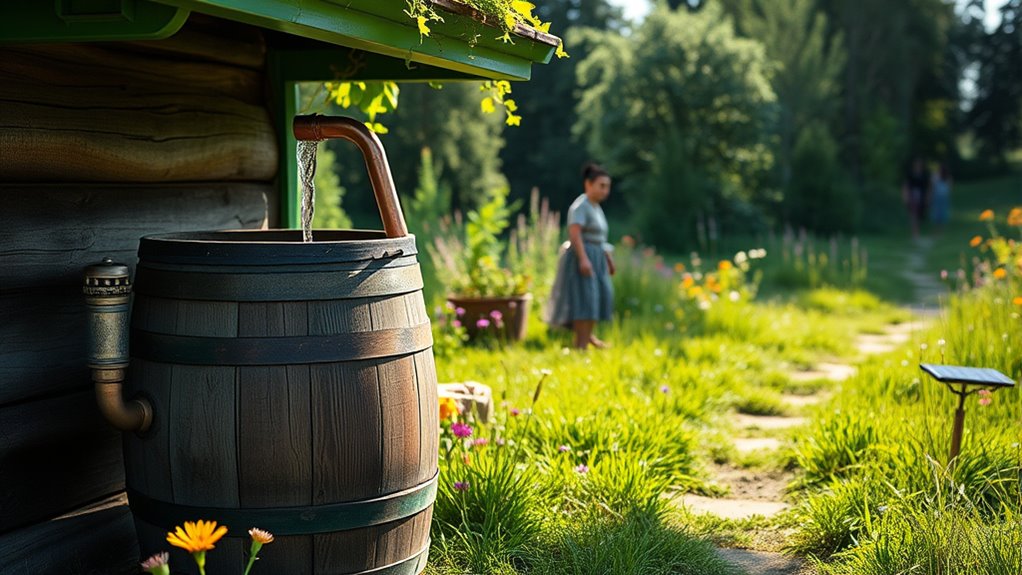
Ever thought about how your daily habits can conserve water and energy? Small changes add up, making a big impact. You can:
- Turn off taps while brushing or washing dishes to save gallons of water daily.
- Switch to energy-efficient bulbs and unplug devices when not in use to reduce electricity waste.
- Install low-flow showerheads and aerators to cut water consumption without sacrificing comfort.
- Use natural sunlight during the day and set thermostats a few degrees lower in winter to lower energy bills.
Supporting Eco-Friendly Brands and Local Products
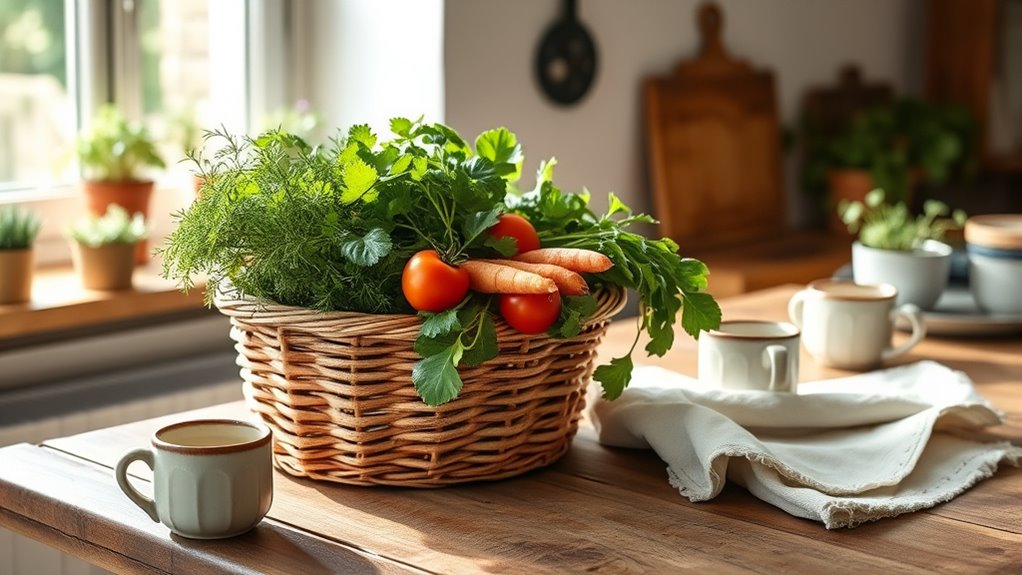
Supporting eco-friendly brands and local products allows you to make a tangible difference in reducing environmental impact. When you choose products from sustainable companies, you support practices that prioritize eco-conscious materials, fair labor, and minimal waste. Opting for local items reduces transportation emissions and boosts nearby economies. Your choices influence market demand, encouraging more companies to adopt greener practices. To help visualize, here’s a quick comparison:
| Eco-Friendly Brands | Local Products |
|---|---|
| Use sustainable materials | Support local artisans |
| Ethical labor practices | Reduce transportation emissions |
| Transparent sourcing | Strengthen community economy |
| Minimize packaging waste | Promote regional culture |
| Invest in renewable energy | Reduce carbon footprint |
Your conscious shopping supports a greener, more sustainable future.
Creating a Green Home Through Simple Repairs and Upcycling
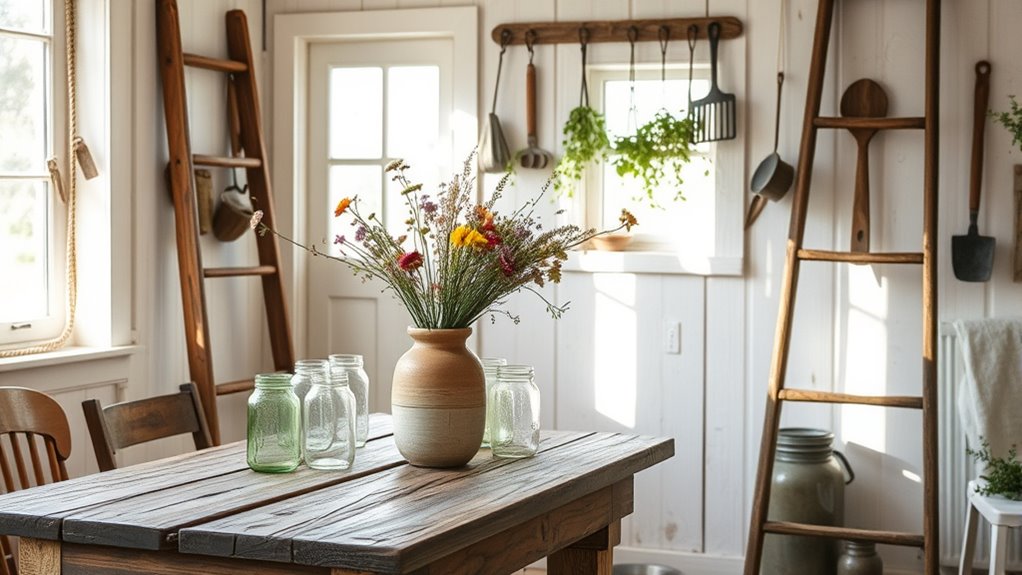
Turning your focus to creating a green home, simple repairs and upcycling offer practical ways to reduce waste and minimize environmental impact. You can breathe new life into old furniture or fix small leaks to conserve water. Imagine:
- Sanding and repainting a worn-out chair, transforming it into a statement piece.
- Reusing glass jars as storage for pantry items or planters.
- Patching holes in walls instead of repainting or replacing entire panels.
- Turning broken or outdated items into creative decor, like turning old t-shirts into reusable cleaning rags.
These small actions prevent waste and cut down on purchases. Upcycling not only saves money but also adds unique character to your space. Every repair and repurpose makes your home more sustainable and personalized.
Connecting With Nature to Enhance Well-Being

Spending time outdoors can considerably boost your mental and physical health, helping you feel more centered and energized. Engaging in activities like walking, gardening, or simply sitting in nature allows you to reconnect and recharge. By making nature a regular part of your routine, you can enhance your overall well-being and resilience.
Nature’s Therapeutic Benefits
Connecting with nature offers powerful therapeutic benefits that can substantially enhance your well-being. When you spend time outdoors, you activate your senses and reconnect with the environment. Imagine:
- Breathing in fresh, clean air as sunlight warms your skin
- Listening to birdsong and rustling leaves, calming your mind
- Feeling the textured bark of trees or smooth stones beneath your fingertips
- Watching vibrant flowers and lush greenery uplift your mood
These simple interactions boost your mood, reduce stress, and improve mental clarity. Nature’s calming presence helps you feel more grounded and present. Regularly engaging with the outdoors fosters resilience and promotes a sense of inner peace, making it an essential part of a balanced, sustainable life.
Outdoor Activities for Wellness
Engaging in outdoor activities not only boosts your physical health but also considerably enhances your overall well-being through direct contact with nature. When you hike, bike, or simply take a walk in the park, you activate your senses and reduce stress. Nature’s calming effects help lower cortisol levels and improve mood. Gardening or outdoor yoga reconnects you with the earth, fostering mindfulness and mental clarity. Sunlight exposure increases vitamin D production, supporting immune health. Being outdoors encourages movement, helping you stay active without feeling like exercise. Plus, outdoor activities promote social connection when done with friends or family, strengthening bonds and reducing feelings of loneliness. Incorporating these simple practices into your routine nurtures both your body and mind, leading to a more balanced, joyful life.
Frequently Asked Questions
How Can I Start Practicing Minimalism Without Feeling Deprived?
You can start practicing minimalism without feeling deprived by focusing on what truly adds value to your life. Declutter gradually, keeping only items that serve a purpose or bring joy. Shift your mindset from scarcity to abundance by appreciating quality over quantity. Embrace simple pleasures like spending time outdoors or enjoying a good book. Remember, minimalism is about freedom and clarity, not deprivation—so prioritize what genuinely makes you happy.
What Are Effective Ways to Track Household Waste Reduction Progress?
You can track your household waste reduction by setting clear goals, like reducing plastic use or composting. Keep a waste journal or use apps to record waste types and amounts regularly. Take photos of overflowing bins before and after waste reduction efforts. Review your progress monthly to identify patterns and celebrate milestones. Involve everyone in your household to stay motivated and make adjustments as needed, ensuring continuous improvement.
How Do I Identify Genuinely Sustainable Brands Versus Greenwashed Ones?
To spot genuinely sustainable brands, start by checking their transparency and certifications like Fair Trade, B Corp, or USDA Organic. Research their supply chain practices, materials, and environmental policies. Look for brands that openly share impact reports and avoid vague claims like “eco-friendly” without proof. Support companies committed to continuous improvement, and stay skeptical of greenwashing—if it sounds too good to be true, it probably is.
What Are Simple Plant-Based Recipes Suitable for Beginners?
You can start with simple plant-based recipes like veggie stir-fry or chickpea salad. Did you know 62% of people seek sustainable products often? These dishes are quick, affordable, and easy to prepare, making them perfect for beginners. Use fresh vegetables, beans, or grains, and experiment with herbs and spices. This approach helps you reduce meat consumption, support sustainability, and enjoy delicious, healthy meals effortlessly.
How Can I Incorporate Eco-Friendly Habits Into a Busy Schedule?
To fit eco-friendly habits into your busy schedule, start small. Use public transport or bike whenever possible, and pack reusable bags and containers to cut waste. Schedule weekly recycling and composting, and choose sustainable brands when shopping online. Incorporate plant-based meals a few times a week, and prioritize repairing instead of replacing items. These simple actions save time, reduce your carbon footprint, and gradually make sustainability a seamless part of your daily routine.
Conclusion
By embracing these simple, sustainable choices, you open the door to a life rich in genuine joy and connection. Imagine walking through a sunlit garden, the scent of blooming flowers filling the air as you sip fresh, plant-based tea. Each mindful step—reducing waste, supporting local brands, or tending your home—paints a vibrant tapestry of balance and purpose. In this gentle dance with nature, you rediscover the profound beauty of living simply and intentionally.







